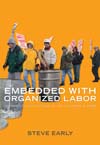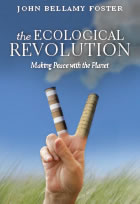environment

[With the permission of Monthly Review Press, Links International Journal of Socialist Renewal is publishing an exclusive excerpt from Steve Early’s new book, Embedded With Organized Labor: Journalistic Reflections on the Class War at Home. Embedded With Organized Labor describes how trade union members in the United States have organised successfully, on the job and in the community, in the face of employer opposition now and in the past. Steve Early has produced a provocative series of essays -- an unusual exercise in “participatory labor journalism” useful to any reader concerned about social and economic justice. As workers struggle to survive and the labour movements try to revive during the current economic crisis, this book provides ideas and inspiration for trade union activists and friends of labour alike.

By Rick Wolff
June 5, 2009 -- The greatest tragedies among many in the collapse and bankruptcy of General Motors (GM) concern what is not happening. There are those solutions to GM's problems not being considered by Obama's administration. There are the solutions not being demanded by the United Auto Workers Union (UAW). There are all the solutions not even being discussed by most left commentators on the disaster. Finally there are crucial aspects of GM's demise not getting the attention they deserve.
Nigeria: The video Shell does not want you to see
June 1, 2009 -- ShellGuilty -- A pre-trial conference scheduled in the potentially landmark lawsuit brought by Nigerian plaintiffs against oil giant Royal Dutch Shell has been delayed until June 3. The conference was announced following the decision by the presiding judge in the US Southern District Court in New York to delay indefinitely the actual trial. Jury selection in the trial itself had been meant to start April 27, but was put off the day before. No new date was set.
Shell is accused of complicity in the 1995 hanging of Ken Saro-Wiwa, a renowned writer and activist, and other leaders of a movement protesting alleged environmental destruction and other abuses by Shell against the Ogoni people in the Niger Delta.
World farmers’ alliance Vía Campesina challenges food profiteers (excerpt from new pamphlet)
Review by John Riddell
La Vía Campesina: Globalization and the Power of Peasants by Annette Aurélie Desmarais. Fernwood Publishing, 2007.
May 31, 2009 -- The neoliberal assault that has driven labour into retreat over the last two decades has also sparked the emergence of a peasants’ international, La Vía Campesina. Based in 56 countries across five continents, this alliance has mounted a sustained and spirited defence of peasant cultivation, community and control of food production.
Annette Desmarais’s book on La Vía Campesina has given us a probing and perceptive account of the world peasant movement’s origins, outlook and activities. (”La Vía Campesina” means “Peasant Path” or “Peasant Way”. See “Peasants or Farmers?” at the end of this article.)
What’s wrong with a 30-hour work week?

By Don Fitz
May 30, 2009 -- With millions of jobs lost during the first part of 2009, who is calling for a shorter work week to spread the work around? Not the Republicans. Not even the Democrats. But why is there nary a peep from unions?
In the US, the vehicle industry sets the pace for organised labour. The only discussion at the top levels of the United Auto Workers Union (UAW) is how quickly the gains won during the last 50 years can be given back. Does the UAW have no memory of the 1930s and 1940s when a shorter work week was at centre of organising demands?
The gross domestic product is plummeting at the same time that jobs are disappearing. Why should there be any connection between the two? If society produces 10% less, why don’t we all just work 10% less? Didn’t things work like that for hundreds of thousands of years of human existence? When people figured out easier ways to get what they needed, they spent less time doing it.
Ten reasons why population control is not an answer to climate change

By Simon Butler
June 1, 2009 -- Climate change is the greatest challenge humanity has ever faced. The scientific evidence of the scale of the threat is overwhelming, compelling and frightening. Climate tipping points -- points which if crossed will lead to runaway global warming -- are being crossed now.
We live in a time of consequences. So it’s crucial that the climate justice movement -- made up of those determined to take a stand now to win a safe climate future -- campaigns for the changes that can actually make a difference.
A discussion has surfaced about whether population-control measures should be a key plank in the climate action movement’s campaign arsenal. Below are 10 reasons why such a decision would hinder, rather than help, the necessary task of building a movement that can win.
1. Population does not cause climate change
Advocates of population control say that one of the most effective measures we can take to combat climate change is to sharply reduce the number of humans on the planet. This wrongly focuses on treating one symptom of an irrational, polluting system rather than dealing with the root causes.

With the permission of John Bellamy Foster and Monthly Review Press, Links International Journal of Socialist Renewal is publishing an exclusive excerpt from Foster's latest book, The Ecological Revolution: Making Peace with the Planet.
Links readers are encouraged to purchase a copy of this important new book HERE.
The roots of the present ecological crisis, John Bellamy Foster argues in The Ecological Revolution, lie in capital’s rapacious expansion, which has now achieved unprecedented heights of irrationality across the globe. Foster compellingly demonstrates that the only possible answer for humanity is an ecological revolution: a struggle to make peace with the planet.
* * *
Biochar: An answer to global warming or a menace?

By Renfrey Clarke
May 21, 2009 -- Sometimes you have to hand it to capitalism. It’s sheer magic the way the system takes promising concepts, steeps them in the transformative power of the market – and turns them into howling social and environmental disasters.
Take biofuels, for example. With fossil fuels warming the planet, why not, indeed, take advantage of the fact that plants use carbon dioxide from the atmosphere to produce sugars and oils that can be turned into substitutes for petrol and diesel?
Malaysian socialist MP on `free market fallacies'

By Dr Michael Jeyakumar Devaraj
May 18, 2009 -- The Nut Graph -- The Socialist Party of Malaysia (PSM) organised a fundraising dinner at the Petaling Jaya Civic Centre on May 9, 2009, which was attended by some 600 members, friends and supporters. I was invited to give a short speech, and this is what I said:
Friends,
Humankind is facing a serious crisis. On one hand we are witnessing the unfolding of a recession many experts think will be the worst since the Great Depression of the 1930s. Recessions are commonplace in the free-market economy. They occur once every 10 or so years.
Capitalism in Wonderland: Why mainstream economists can't deal with the ecological crisis

By Richard York, Brett Clark and John Bellamy Foster (posted at Links International Journal of Socialist Renewal with permission)
In a recent essay, “Economics Needs a Scientific Revolution”, in one of the leading scientific journals, Nature, physicist Jean-Philippe Bouchaud, a researcher for an investment management company, asked rhetorically, “What is the flagship achievement of economics?” Bouchaud’s answer: “Only its recurrent inability to predict and avert crises”.[1]
Mexico's Revolutionary Workers Party (PRT) statement on swine flu epidemic

Statement by the Revolutionary Workers Party (PRT)
April 30, 2009 -- The health emergency brought about by the swine flu epidemic has important political and social repercussions, in addition to consequences for public health, that need to be explained in the midst of the confusion and distrust that contradictory governmental versions generate. It is also necessary to open the way to scientific information, truth and political criticism.